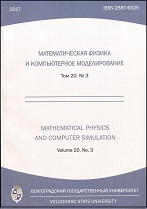|
Mathematics and mechanics
On a class of functional equations
V. A. Kyrov
Gorno-Altaisk State University
Abstract:
Differentiable considered class $C^4$ function $f_{1,2}:S_f\to R$, $S_f\subset R^{n+1}\times R^{n+1}$:
$$ f_1(x,y) = \sigma\left(\theta(x,y),w\right),\, f_2(x,y) = \varkappa\left(\theta(x,y),z\right),
$$
where $\theta$, $\sigma$, $\varkappa$ — are functions of class $C^4$, $\theta(x,y)=\theta(x^1,\ldots,x^n,y^1,\ldots,y^n)$, $w = x^{n+1}-y^{n+1}$, $z = x^{n+1}+y^{n+1}$, and the following inequalities hold:
$$ \dfrac{\partial\theta}{\partial x^{i}}\ne0,\,\dfrac{\partial\theta}{\partial y^{i}}\ne0,\,\dfrac{\partial \sigma}{\partial\theta}\ne0,\,\dfrac{\partial \sigma}{\partial w}\ne0,\,\dfrac{\partial \varkappa}{\partial\theta}\ne0,\,\dfrac{\partial \varkappa}{\partial z}\ne0. $$
The functions $ f_{1,2} $ are two-point invariants of the action of some Lie group in the space $ R^{n+1}$.
The criterion of local invariance of such an action for these functions leads to functional differential equations:
$$ ((Y(x))'_{x^{n+1}} + (Y(y))'_{y^{n+1}})\varphi'_{w} + (Y(x) - Y(y))\varphi''_{ww} = 0,(1) $$
$$ ((Y(x))'_{x^{n+1}} + (Y(y))'_{y^{n+1}})\lambda'_{z} + (Y(x) + Y(y))\lambda''_{zz} = 0,(2) $$
where $\varphi(\theta,w) = -\frac{\partial \sigma}{\partial w}/\frac{\partial \sigma}{\partial \vartheta}$ and $\lambda(\theta,z) = -\frac{\partial \varkappa}{\partial z}/\frac{\partial \varkappa}{\partial \theta}$.
Theorem 1. In the neighborhood $U(\langle x,y\rangle)$ the equation $(1)$, where $w = x^{n+1} - y^{n+1}$, $Y\ne\text{const}$, $\varphi'_w\ne0$, has the following solutions:
$$ Y = C(x^1,\ldots,x^n),\,\varphi = a(\theta)w + b(\theta); $$
$$ Y = rx^{n+1} + c,\,\varphi = a(\theta)\dfrac{1}{w} + b(\theta); $$
$$ Y = r(x^{n+1})^2 + c,\,\varphi = a(\theta)\dfrac{1}{w} + b(\theta);$$
$$ Y =r\cos(\omega x^{n+1} + \alpha) + c,\,\varphi = a(\theta)\text{ctg}\dfrac{\omega w}{2} + b(\theta); $$
$$ Y =re^{\omega x^{n+1}} + c,\,\varphi = a(\theta)\dfrac{e^{\omega w}}{e^{\omega w}-1} + b(\theta); $$
$$ Y =r\cosh(\omega x^{n+1} + \alpha) + c,\,\varphi = a(\theta)\text{cth}\dfrac{\omega w}{2} + b(\theta); $$
$$ Y =r\sinh(\omega x^{n+1} + \alpha) + c,\,\varphi = a(\theta)\text{th}\dfrac{\omega w}{2} + b(\theta), $$
where $r,c,\alpha = \text{const}$, $C(x^1,\ldots,x^n)\ne\text{const}$, $a(\theta), b(\theta)$ — are functions of class $C^3$, $a(\theta)\ne0$.
Theorem 2. In the neighborhood $U(\langle x,y\rangle)$ the equation $(2)$, where $z = x^{n+1} + y^{n+1}$, $Y\ne0$, $\lambda'_z\ne0$, has the following solutions:
$$ Y = C(x^1,\ldots,x^n),\,\lambda(\theta,z) = a(\theta)z + b(\theta); $$
$$ Y = rx^{n+1} + c,\,\lambda = a(\theta)\dfrac{1}{rz+2c} + b(\theta); $$
$$ Y =r\cos(\omega x^{n+1} + \alpha),\,\lambda = a(\theta)\text{tg}\dfrac{\omega z+2\alpha}{2} + b(\theta); $$
$$ Y =re^{\omega x^{n+1}},\,\lambda = a(\theta)e^{-\omega z} + b(\theta); $$
$$ Y =r\cosh(\omega x^{n+1} + \alpha),\,\lambda = a(\theta)\text{th}\dfrac{\omega z+2\alpha}{2} + b(\theta); $$
$$ Y =r\sinh(\omega x^{n+1} + \alpha),\,\lambda = a(\theta)\text{cth}\dfrac{\omega z+2\alpha}{2} + b(\theta), $$
где $r,c,\alpha = \text{const}$, $C(x^1,\ldots,x^n)\ne\text{const}$, $a(\theta), b(\theta)$ — are functions of class $C^3$, $a(\theta)\ne0$.
Keywords:
functional equation, functional differential equation, differential equation.
Citation:
V. A. Kyrov, “On a class of functional equations”, Mathematical Physics and Computer Simulation, 20:5 (2017), 17–26
Linking options:
https://www.mathnet.ru/eng/vvgum202 https://www.mathnet.ru/eng/vvgum/v20/i5/p17
|

|




 Contact us:
Contact us: Terms of Use
Terms of Use
 Registration to the website
Registration to the website Logotypes
Logotypes








 Citation in format
Citation in format 